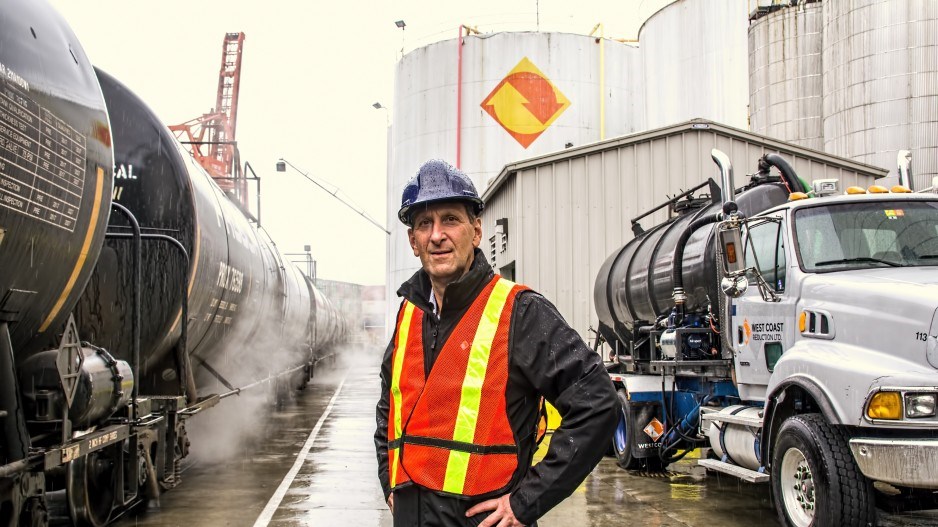Port of Vancouver’s plans for a container terminal where an agricultural terminal currently sits threatens B.C.’s food security, the Sustainable Food Alliance of BC (SFABC) says.
“The port must prioritize the needs of our local agricultural sector, the people of B.C. and our climate, over a back-up plan for a container terminal that puts our industry at risk,” alliance executive director Ken Ingram said. “That’s why we’re appealing to the government of Canada to recognize the vital importance of West Coast Reduction’s role in Canada’s agricultural supply chain.”
The alliance said the port’s refusal to grant West Coast Reduction a lease extension, “simply to hold the land as a possible future terminal for overseas cargo containers is creating needless risk for agricultural producers and threatening the long-term viability of the domestic food system.”
The facility is on Vancouver harbour’s south shore at the foot of Commercial Drive.
West Coast Reduction originally focused on rendering inedible animal byproducts from butchers and slaughterhouses into pet food, soap and other products. More recently, however, it has been selling a lot of the tallow and lard it produces to refiners, who blend the biofuel with crude oil to make low-carbon gasoline and diesel.
According to the company’s website, it recycles one billion pounds of animal waste every year into 100 million pounds of fats and protein meal products used to make products for agricultural and industrial applications.
The company says it also handles half of Canada’s canola oil exports bound for Asia Pacific markets and 20% of national canola oil exports. The port, however, said Pacific Coast Terminals also handles canola oil.
West Coast president Barry Glotman said that while there remains a struggle between container and agricultural traffic needs in the port, West Coast fills a niche not only for farmers but also environmentally because it produces biofuel feedstock.
The family-owned company employs approximately 400 people in six facilities in Western Canada. But Glotman said the port location “is the flagship and market for our finished products. It basically creates value for the farmer.”
He added that the facility has operated under 25-year leases, which allows the company to plan long-term to remain technologically viable. He said West Coast, which has operated at the Port of Vancouver site since 1964, had a conditional extension with the port for 2026-31.
Glotman suggested that the port wants the site because the Vancouver Fraser Port Authority continues to be embroiled in a prolonged battle over its proposed $3 billion Roberts Bank Terminal 2 container port expansion project.
On the other hand, he said, “our customers are looking for certainty.”
The port’s website describes West Coast Reduction as “a leader in the rendering industry.”
Port spokeswoman Arpen Rana said details of any commercial relationships between the port and its tenants are confidential and cannot be commented on.
She said the port authority’s mandate is to enable international trade.
“One of these considerations is the diminishing availability of trade-enabling industrial land in the Metro Vancouver region, which will be exhausted within a decade, and could lead to the inefficient movement of goods throughout the region, significantly impacting the local economy,” Rana said in an email response. “As such, the port authority is looking at what uses are occupying the federal lands we manage to ensure those lands are being used for the primary benefit of enabling Canada’s trade.”
Rana said she could not discuss other possible port sites for West Coast.
“There’s no place else to go,” Glotman said, explaining that West Coast’s infrastructure is worth $250 million.
“Who’s going to pay for it?”
West Coast Reduction’s production of raw materials for biofuel producers also plays an important role in federal and provincial greenhouse gas reduction efforts.
One of those producers is Calgary-based Parkland Corp. (TSX:PKI). Vice-president Ryan Krogmeier said in a June 9 letter to Glotman that West Coast has the only facility in Western Canada that can refine and blend the bio-feedstocks used in Parkland’s Burnaby co-processing operations that help meet the B.C. government’s low carbon fuel objectives.
Krogmeier added that canola oil is also needed for the increase in local renewable fuel production identified in B.C.’s CleanBC Plan.
Glotman said 90% of his company’s animal fats go into low-carbon fuel.
Advanced Biofuels Canada president Ian Thomson said, “West Coast Reduction’s Port of Vancouver operation is an essential enabler of clean fuel sector growth in the decades ahead. The loss of this facility would set Canada back decades in the development of a competitive clean fuels sector.”
SFABC wants Ottawa to intervene in the situation to extend West Coast Reduction’s lease, without conditions tied to container terminal ambitions. •




